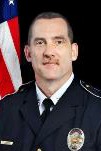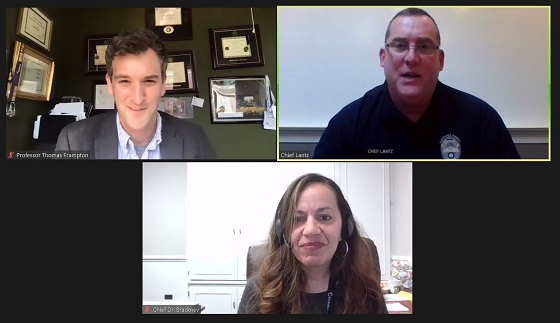Community Policing
The chiefs of police from Charlottesville and Albemarle explored these issues and many more during the December SSV Zoom meeting.
●Supporting our police while conveying the message we want to see change; ●De-escalating strategies; ●Implicit bias training; ●Lessons learned about policing from cities such as Columbus, Cincinnati, Cleveland and Detroit; ●How to engage our community in a conversation with our local police about these issues?
The Zoom video of the “Ask the Chiefs” event can be watched by clicking here.
The podcast is also available.
 Prior to her appointment as the chief of police in Charlottesville, Dr. RaShall M. Brackney retired after 30-years with Pittsburgh Bureau of Police. Additionally, she served as the chief of police for the George Washington University. She is a recognized expert in the areas of harm reduction, procedural and restorative justice practices, and community-police relations. Additionally, as a result of her work in social and racial justice, Dr. Brackney was granted a fellowship to Carnegie-Mellon University’s Institute for Politics and Strategy where she specializes in the influence of race on politics and policy. She earned Bachelors and Masters Degrees from Carnegie-Mellon University and a Ph.D. from Robert Morris University, and is a graduate of the FBI National Academy in Quantico, Virginia; the United States Secret Service Dignitary Protection course in Washington, D.C.; and Leadership Pittsburgh XIX.
Prior to her appointment as the chief of police in Charlottesville, Dr. RaShall M. Brackney retired after 30-years with Pittsburgh Bureau of Police. Additionally, she served as the chief of police for the George Washington University. She is a recognized expert in the areas of harm reduction, procedural and restorative justice practices, and community-police relations. Additionally, as a result of her work in social and racial justice, Dr. Brackney was granted a fellowship to Carnegie-Mellon University’s Institute for Politics and Strategy where she specializes in the influence of race on politics and policy. She earned Bachelors and Masters Degrees from Carnegie-Mellon University and a Ph.D. from Robert Morris University, and is a graduate of the FBI National Academy in Quantico, Virginia; the United States Secret Service Dignitary Protection course in Washington, D.C.; and Leadership Pittsburgh XIX.
 Ron Lantz, chief of police for Albemarle County, completed his career with the Fairfax County Police Department by serving as a district station commander where he was responsible for 155 officers providing police service to the 125,000 residents. He has been with the Albemarle County Police Department since December 2012, where he served as Deputy Chief until his appointment to chief June 1, 2016. In addition, Ron was responsible for leading the implementation of the County’s Geographic Based Policing initiative, which was launched in 2012. Ron serves on several boards to include the ECC executive board, the ASAP executive board, GRACE executive board, VLEPS commission, and executive director of region for Special Olympics Torch Run.
Ron Lantz, chief of police for Albemarle County, completed his career with the Fairfax County Police Department by serving as a district station commander where he was responsible for 155 officers providing police service to the 125,000 residents. He has been with the Albemarle County Police Department since December 2012, where he served as Deputy Chief until his appointment to chief June 1, 2016. In addition, Ron was responsible for leading the implementation of the County’s Geographic Based Policing initiative, which was launched in 2012. Ron serves on several boards to include the ECC executive board, the ASAP executive board, GRACE executive board, VLEPS commission, and executive director of region for Special Olympics Torch Run.
 The program will be moderated by Thomas Frampton, associate professor of law, University of Virginia School of Law, an expert in criminal law and constitutional procedure.
The program will be moderated by Thomas Frampton, associate professor of law, University of Virginia School of Law, an expert in criminal law and constitutional procedure.
.
.
Program Summary
The Zoom meeting began with President Jeff Gould presiding over a brief SSV Annual Meeting. The slate from the Nominating Committee was approved with Sue Friedman for vice president/program chair; Jim Peterson for treasurer; and Bonnie Brewer and Norman Dill for directors. Financial, membership and program committee reports were presented.

President Gould then turned the meeting over to Thomas Frampton, UVA Law professor and expert on criminal law and constitutional procedure, who would moderate the program. Charlottesville Police Chief Dr. RaShall Brackney and Albemarle Police Chief Ron Lantz were the presenters. An “Ask the Chief” presentation followed with questions from the audience and moderator.
The first question was, “How do you define community policing?” Lantz explained that since 2012 the county has been divided into two geographic based districts with each staffed by its own officers in order for the community and officers to get to know each other better. As a result, there has been a 30 percent decrease in crime and police response times, and there is increased trust between the police and community. Brackney avoids the term “community policing” and stresses her emphasis on relationship building with citizens in order to determine what they want, need and deserve.
The effect of COVID on police policy has both departments relying more on phone or online reporting from citizens, which has been beneficial in some instances and may be used more in the future. There has been a decrease in violent crimes and traffic stops. On the other hand, there have been concerns about increases in domestic violence, homicides and suicides as well as an underground economy with so many unemployed, e.g., drug dealing.
Other questions involved how prepared are the police for the next big demonstration, internal and external oversight of the police, 5th amendment right about property taken by police, progressive prosecutors, and implicit bias training of police.
This program was very informative and the chiefs covey a sincere desire to improve the relationship between the citizens and police and are working hard to promote public safety. You are urged to watch the video or listen to the podcast.
